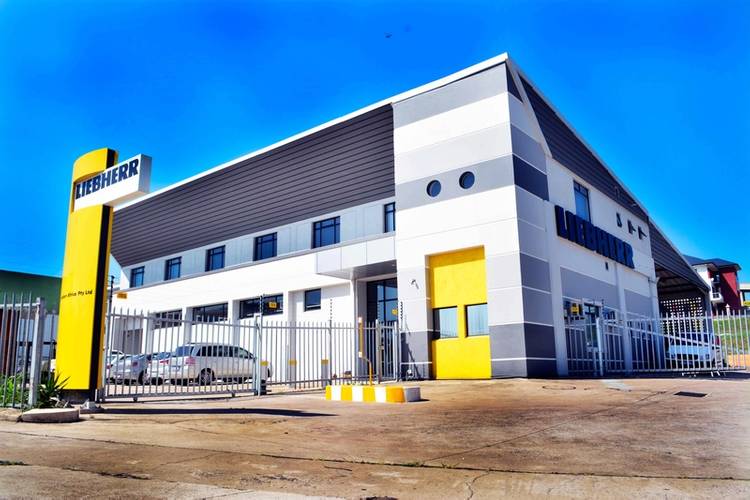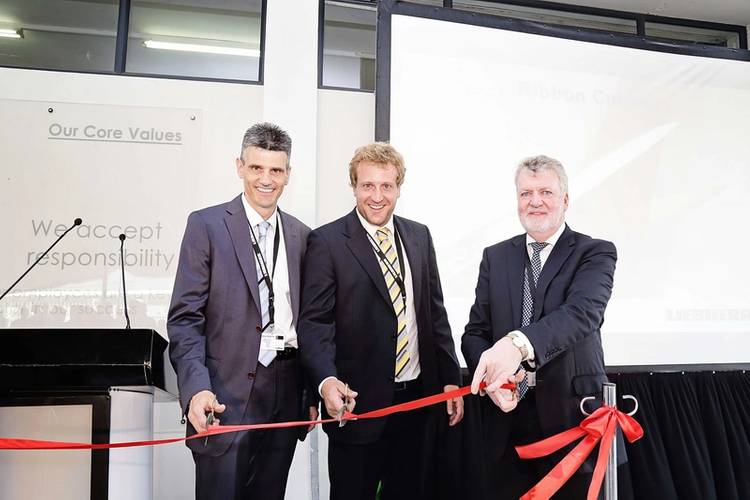Liebherr Opens African Maritime Hub
Liebherr Maritime Cranes celebrated the grand opening of the new sales and service center in Durban, South Africa. The new African maritime hub was opened by a number of guests from the local industry and Liebherr representatives. Mainly as a result of the close cooperation with Transnet over the past few years, Liebherr-Africa (LAF) has decided to extend its activities and to establish a specialized maritime hub in Durban.
Transnet operates more than 60 Liebherr cranes, 13 mobile harbor cranes, 31 ship to shore container cranes and 18 rubber tyre gantry cranes. A Supplier Development (SD) agreement between Transnet and Liebherr is the latest expression of this long lasting partnership. Liebherr Africa is a fully owned subsidiary of the Liebherr Group which comprises more than 130 companies worldwide. Present since 1958 in South Africa, Liebherr Africa is serving the needs of the local mining, construction and civil engineering industries for more than 57 years.
The maritime division of the manufacturer Liebherr said it decided to establish an African maritime hub in South Africa because of the steadily growing maritime demand in the region. Placed in a central position, out of Durban, the hub ensures that Liebherr’s Africa based clients are getting the same level of service and support as could be expected when dealing directly with the head office in Europe, the company said. With this hub, Liebherr Africa covers various requirements as mining companies need adequate infrastructure and competence to ship mineral resources as well as equipment into and out of adjacent countries.
“The investment in the new African maritime hub is very important for the maritime industry in southern Africa. It ensures fast and high quality customer service in terms of maintenance, spare parts supply and personnel training,” commented Liebherr-Africa Maritime Cranes Divisional Manager Henner Rodenwoldt.
Over 90 percent of the import and export trade in southern Africa are made by sea. Consequently, the ports in the region play a very important role for the economies in southern Africa. The two major ports are the Port of Durban, a container terminal in the Southern Hemisphere, and the port in Richards Bay, which is one of the world’s largest bulk terminals for coal.
The new African maritime hub consists of sales, service and training personnel, who are all factory trained. It also holds a significant spare parts stock, which will service a large part of the African market. A main feature is the training of operators, technicians and service staff as the hub provides two separate classrooms for training on Liebherr crane solutions. The classrooms are utilized for theoretical and/or maintenance training with a corresponding schematic and simulation wall. Moreover, various maritime crane simulators are available for professional training on ship to shore cranes, mobile harbor cranes, rubber tyre gantry cranes and offshore cranes. Key personnel, such as leading sales managers, technical advisors, service managers are all from the factory itself to not only assist in training local staff but also to drive forward the maritime industry on the African continent.
Due to the well-skilled Liebherr personnel, several service projects have been accomplished through the South African setup. In 2015 the African maritime hub will be involved in an outstanding project with two Coeclerici vessels, Bulk Zambesi and Bulk Limpopo. Both vessels are sailing under the Italian flag, operating as transshipment hubs for VALE Brazil in Beira, Mozambique. Each vessel is equipped with five Liebherr CBG 350 heavy duty four rope grab cranes. The cranes will run through a trial period operated with the intelligent grabbing technology SmartGrip, which was launched by Liebherr Maritime Cranes for port bulk handling in June 2014. Liebherr will install SmartGrip on the CBG 350 ship cranes and then test the technology for open sea operation on both transshipment hubs in Mozambique. The rough environment for coal transshipment, operating under floating condition with the influence of waves, wind and the permanent moving of the units is the main focus of the trial period before launching SmartGrip for open sea transshipment operation.
Fabio Torriani, Head of Crew Management and Procurement at Coeclerici Shipping Services, reported, “Coeclerici is really looking forward to the collaboration with Liebherr-Africa. We are confident that the SmartGrip trial period on our vessels will be constructive and successful in order to get remarkable results.”
SmartGrip is the solution for optimized grab filling rates and provides valuable advantages including the elimination of overloads, less stress for the driver and higher turnover of up to 30%. Furthermore SmartGrip partly closes the gap between high-skilled and less-skilled drivers, as some important parts of bulk handling are automatically optimized by the system. Also operators of older Liebherr machines can easily equip their existing cranes with this unique feature for more bulk turnover.

















